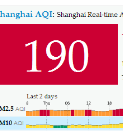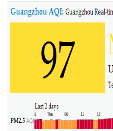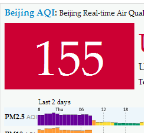-
In late January, a donation of masks and thermometers from the Japan Youth Development Association in Tokyo to Hubei Province caused a heated debate on Chinese social media.
This was because of the powerful poetic message written on each box: “山川异域,风月同天。”.It literally translates to “ Mountains and rivers on foreign land wind and moon under the same sky.” or officially ,“Lands apart, sky shared ”Besides the heartfelt regard and the elegant (优美的) language, the quote also alluded (暗指) a significant moment in the history of cultural exchange between the two countries.
The line comes from a seventh century Buddhist hymn (佛教圣歌) by prince Nagaya, a politician from the Nara period(710-794)of Japan, titled “Embroidered on Kasaya Robes for good Karma”: Lands apart, sky shared. For the disciples of Buddha, to nurture good karma.
The hymn was embroidered(绣) on 1,000 Buddhist robes(袍子)which Prince Nagaya had made and sent to the Tang court in China. It's a part of his invitation for Chinese Buddhist monks to visit Japan. The poem was also included in the Complete Tang Poems. The largest existing collection of Tang poetry.
Inspired by the Prince’s hymn, Jianzhen, decided to go on a voyage to Japan. After six attempts and the loss of his eyesight, Jianzhen finally arrived, and made a significant contribution to the spread of Buddhism in Japan.
The reference does not only invoke(引用) shared history, but also common appreciation for ancient poetry in the Chinese language. Many in china were touched by the poetic expression of support from Japanese citizens during the COVID-19 outbreak.
1.Why did the donation cause a heated debate?
A.Because it came from Japan B.Because it was donated to Hubei province
C.Because of the poetic message on boxes D.Because it was from china
2.“Lands apart, sky shared. ” expresses a lot EXCEPT .
A.the heartfelt regard B.the elegant language
C.the significant moment in the history D.Japan’s love for Chinese culture
3.Who wrote the poem " Embroidered on Kasaya Robes for Good Karma"?
A.A poet from China B.A poet of Japan
C.A monk from China D.A politician of Japan
4.What does“ the reference” refer to in the last paragraph?
A.For the disciples of Buddha to nurture good karma. B.The Complete Tang Poems.
C.The largest existing collection of Tang poetry. D.Lands apart, sky shared.
5.What can we know from Paragraph 4 and 5?
A.The poem was embroidered on 10,000 Buddhist robes.
B.Jianzhen was inspired by the prince hymn and decided to be a traveler.
C.The poem was included in the largest existing collection of Tang poetry.
D.After six attempts and the loss of his hearing, Jianzhen finally arrived in Japan.
九年级英语阅读单选简单题查看答案及解析
-

Aged between 18 and 40? Can you work 8 hours a day to help sort parcels(分拣包裹)from late January to the end of February?
Pay rates(付费标准)
7:00 a.m.—6:00 p.m. ¥12/hour
6:00 p.m.—7:00 a.m. ¥15/hour
If you are careful and can work well with others, please join us.
For more information, call 400 889 5543.
1.If Wang Qiang works from 9:00 a.m. to 5 p.m., how much can he get?
A.¥75. B.¥96. C.¥120.
2.The material may be from a _____________.
A.book B.dictionary C.newspaper
九年级英语阅读单选简单题查看答案及解析
-
Chinese New Year begins in late January1.early February. It is one of the2.(great) festivals in China.
Many things are done to get ready3.this festival. The house is cleaned in the days before the holiday. No sweeping is done on the holiday because people worry about that good luck will be cleaned away. Best 4.(wish)are written on red paper and hung around the house.
One the5.(one) day of Chinese New Year, children are given red envelopes. Food is 6. important part of the holiday season. Special foods are7.(eat)on certain days. Different foods have different 8.(mean) behind them. For example, fish is said to mean success.
Chinese New Year is9.(certain) regarded as a time to be with one's family. Many visits are done during the 15 days. Many traditions are to honor family members who10.(die) in the past.
What an interesting festival it is!
九年级英语语法填空中等难度题查看答案及解析
-
There are two terms in a school year in America. The first is from September to January, and the second is from February to June.
American children usually begin to go to school at the age of five. Most students are 17 or 18 years old when they finish high school. High school students have only four or five subjects each term. They usually go to the same class every day, and they have homework for each class. After class they do many interesting things.
After high school, many students go to college. They usually have to pay a lot of money. So many college students work after class to get the money for their studies.
根据短文内容,判断下列句子正误。正确为“T”,错误为“F”,并将其字母标号填入答题卡相应的题号内。
1.There are two terms in a school year in America.
2.The second term begins in January.
3.There are only four or five subjects each year.
4.Many students go to college after high school.
5.Many American college students make money for their studies.
九年级英语阅读理解中等难度题查看答案及解析
-
阅读文章,判断正(T)误(F)。
In January 1998 two pigs escaped from west of London. The pigs were going to be killed for meat. For almost a week, they hid in the woods around the town of Malmesbury.
When the local police began to look for the pigs, newspaper reporters from all over the country joined them. Soon people everywhere were reading about the adventures(历险记) of Butch and Sundance with great interest. The owner of the pigs said that if they were found, he would sell them to anyone who would give them a home. A number of newspapers tried to buy the pigs, and finally The Daily Mail paid a lot of money for them.
One rainy night, six days after the escape, a reporter from The Daily Mail and some people from the town found Butch in the woods. They caught her and put her in a cage. The next day, Sundance was caught, too.
The pigs were sent to a zoo. They were no longer free, but they were alive!
1.The two pigs escaped from their owner for fearing of being killed.
2. The two pigs hid for almost a week in the woods.
3. People everywhere joined the local police in looking for the pigs.
4. The name of the two pigs were Butch and Sundance.
5.The Daily Mail is a reporter.
九年级英语阅读理解困难题查看答案及解析
-
Chang’e-4 landed on the back of Moon 3rd January this year.
A.on B.in C.at D.from
九年级英语单选题中等难度题查看答案及解析
-
I remember Susan left _______ a very cold morning of January.
A. in B. on C. at D. from
九年级英语单项填空中等难度题查看答案及解析
-
Ma Yun has had much success ______ his business and donated much of his money
the charities.
A. in; for B. in; to
C. at; to D. at; for
九年级英语单项填空中等难度题查看答案及解析
-
The local government of Haidian and the Internet company Baidu had an agreement in January, 2018. They wanted to develop “smart city” building together. Haidian Park was chosen by them. Why was Haidian Park chosen? It is because the park covers about 34 hectares(公顷)near the 4th Ring Road. And it received about 1.2 million tourists last year. It took the workers 10 months to change Haidian Park into an artificial intelligence(AI)(人工智能)theme park. Haidian Park lies in northern Beijing. So Haidian Park became China's first artificial intelligence theme park. It was opened to the public in early November.
Now the park has driverless buses, smart lamp posts(灯柱)and smart speakers. The buses themselves can run according to the directions from a computer. The smart lamp posts can record a lot of data quickly and well. The smart speakers can understand human instructions correctly. The park gives people a totally new look. People can experience different artificial intelligence here.
Che Jianguo said that a total of 10 government departments and companies took part in the rebuilding of the park over the past 10 months. He comes from the park office and he is in charge of the program.
In recent years, Chinese high-tech companies begin to do some things in the artificial intelligence industry. The central government also said in October that it would help the development of the country's new generation of artificial intelligence.
1.Haidian Park was chosen to become the “smart city” because_____________.
A.it is the biggest park in Beijing
B.it is next to the 4th Ring Road
C.it lies in northern Beijing
D.it has large size and is popular
2.The underlined word “driverless” in Paragraph 2 means “_____________” in Chinese.
A.无人驾驶的 B.有座位的 C.跑得快的 D.无扶梯的
3.Today, Chinese high-tech companies pay more attention to_____________.
A.the global economy
B.the artificial intelligence industry
C.the development of our country
D.the big international background
4.The best title of the text is “_____________”.
A.Haidian Artificial Intelligence Theme Park
B.Chinese High-tech Companies
C.The Internet Company Baidu
D."Smart City" Building
九年级英语阅读单选中等难度题查看答案及解析
-
阅读下面材料,从每题所给的三个选项(A、B和C)中,选出最佳选项。
In the months of December and January, China experienced some of the worst air pollution in its history. At times, Beijing’s Air Quality Index(AQI)was measured at 406. Any AQI reading over 150 is considered “unhealthy” and any reading over 300 is considered “hazardous.” In Shanghai, we had several days when the AQI neared 300. The PM2.5 readings were also high. PM2.5 refers to particulate (微粒的)matter smaller than 2.5 microns(微米) in diameter. These particles are small enough to get into the lungs and can cause cancer and other lung diseases.
China is now becoming acutely aware that the rush to development has come at a price and may be endangering the health of its citizens. This is something other countries have faced before. The U.K. used to be the most polluted country in the world. It wasn’t until London’s Big Smog of 1952 that people realized that air pollution was a real health hazard. Twelve thousand deaths were directly related to that “pea-souper(浓雾)” and it resulted in Parliament(英国议会)passing the Clean Air Act(《清洁空气法案》)of 1956.
China will no doubt pass similar laws. It’s a choice between wealth and health. As Beijingers and Shanghainese coughed their way through December and January, the choice may have become easier to make.

1.According to the following AQI, if you are in _________now, it is healthy for you.



A. Shanghai. B. Guangzhou. C. Beijing.
2. Why did Parliament pass the Clean Air Act of 1956?
A. Thousands of people died because of the “pea-souper”.
B. The PM2.5 readings were very low in UK.
C. The Parliament wanted to pass more laws.
3. Which of the following is True according to the passage?
A. The U.K. is the most polluted country in the world now.
B. PM2.5 may cause cancer and other lung diseases.
C. China will not pass similar laws like the Clean Air Act.
4.The underlined word “hazardous” means “______” in Chinese.
A. 危险的 B. 温和的 C. 健康的
5. According to the passage, why will China pass laws to make air cleaner?
A. It may help the country develop more rapidly.
B. People can’t make the choice between wealth and health.
C. People realize air pollution was a real health hazard.
九年级英语阅读理解困难题查看答案及解析